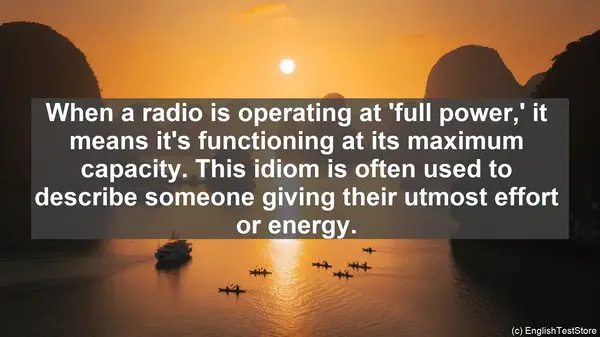1. ‘On the Same Wavelength’
This idiom means to have a similar understanding or thinking. In radio mechanics, it’s crucial for team members to be on the same wavelength to ensure smooth communication and efficient work.
2. ‘Tune In’
When you ‘tune in’ to a radio station, you adjust the frequency to receive the desired signal. In a broader sense, this idiom means to focus or pay attention to something specific.
3. ‘Static’
In radio mechanics, ‘static’ refers to unwanted noise or interference. Outside the technical context, it’s often used to describe a situation with no progress or clarity.

4. ‘Signal the Alarm’
This idiom means to raise awareness or alert someone about a potential problem. Just like in radio mechanics, where signals are crucial for communication, ‘signaling the alarm’ can prevent major issues.
5. ‘In the Loop’
Being ‘in the loop’ means being informed or involved in a particular situation. In radio mechanics, it’s important to keep everyone ‘in the loop’ to maintain coordination and avoid misunderstandings.
6. ‘Full Power’
When a radio is operating at ‘full power,’ it means it’s functioning at its maximum capacity. This idiom is often used to describe someone giving their utmost effort or energy.
7. ‘Off the Air’
In radio mechanics, when a station is ‘off the air,’ it means it’s not transmitting. Outside the technical context, it’s used to describe something that’s temporarily unavailable or not functioning.
8. ‘Back to Square One’
This idiom refers to starting over or returning to the initial stage of a process. In radio mechanics, it can be related to troubleshooting or resolving an issue from the beginning.
9. ‘Cutting Edge’
Something that’s ‘cutting edge’ is at the forefront of innovation or technology. In radio mechanics, staying updated with ‘cutting-edge’ equipment and techniques is essential.

10. ‘In Good Shape’
When something is ‘in good shape,’ it means it’s in excellent condition or working well. In radio mechanics, this can refer to equipment, connections, or even a project’s progress.


